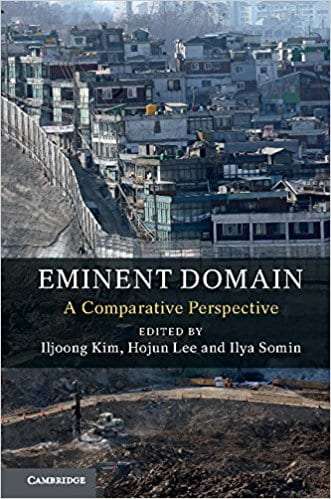The Volokh Conspiracy
Mostly law professors | Sometimes contrarian | Often libertarian | Always independent
The Korean origins of "Eminent Domain: A Comparative Perspective"

The chapters in our new book, Eminent Domain: A Comparative Perspective are based on papers that were originally presented at an international conference on eminent domain entitled "Shifting the Paradigm for Sustainable Development: Eminent Domain and Property Rights." The event was hosted by the Korea Development Institute (KDI) in Seoul in March 2015. The conference was inspired by ongoing observations of the Korean editors - Iljoong Kim and myself - that takings were causing serious conflict between condemners and owners of condemned property in Korea.
Even worse, the tension has been increasing fast in recent years. Although much research was conducted worldwide on identifying the causes behind the past astounding economic growth of Korea since the 1970s, we thought that, to break the current impasse and to secure sustainable development for the future, at least an equal amount of endeavor would be necessary to improve the relevant laws associated with eminent domain and its impact on development.
In the process of searching for reasonable solutions over several years, we became increasingly convinced that it would be tremendously beneficial to provide a forum where researchers from around the world could gather and share their views. That way, we can learn faster and better from the experience of others. Therefore, in early 2014, the final decision was made to hold the KDI international conference . One of its key objectives was to help map out an agenda for reform, by scrutinizing the eminent domain systems of various countries.
Around the world, consciousness about protecting property rights against the abuse of takings power has grown in both advanced and developing countries recently. It increased very rapidly since 2005, when the backlash against the Kelo decision began in the U.S. Nevertheless, many developing countries, in particular, have still shown a strong tendency toward prioritizing the seizure of property for economic growth rather over protecting private property rights. This has been a primary reason why comparative studies, which encompass both advanced and developing countries, have been very scarce.
In this regard, this volume is unique as we examine a wide range of countries. They include advanced economies such as the United States, Germany, and the European Union, emerging economies including Korea and Taiwan, and various developing economies selected by contributors affiliated with the World Bank.
Another distinctive feature of this volume is that all contributors used a common set of criteria for analyzing the eminent domain systems they covered. For this goal, we chose, among others, the six most critical components generally constituting any system of taking laws before officially launching this ambitious project. We called these components the "Six Pillars" of takings law:: (1) Public Interest Criteria (limitations on the purposes for which property can be condemned, (2) Subjects of Takings (entities empowered to condemn property), (3) Just Compensation, (4) Due Process (for owners of condemned land), (5) the Distribution of Development Surplus from Takings, and (6) the Dispute Resolution System. We chose this approach to maximize the comparative value of this volume even if we were well aware that that certain components would be relatively more in some countries than others.
Readers can easily compare the core characteristics of eminent domain systems across countries and understand their implications. We hope that this book will be a useful reference to economists, legal scholars, and student, particularly in the field of the law and economics, constitutional law, property law, and comparative law. It can also be helpful to public officials, judges, legislators, and interested laypeople.


Show Comments (0)